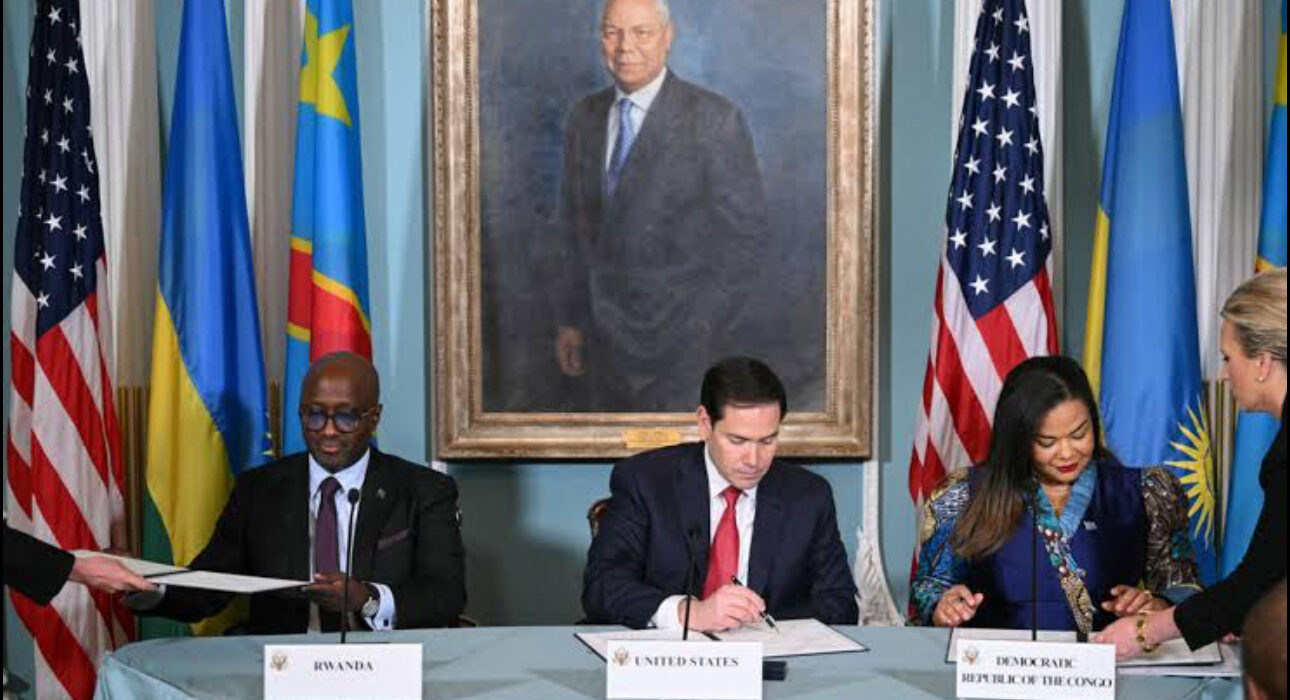Rwanda and DR Congo Sign U.S.-Brokered Peace Deal to End 30-Year Conflict

In a landmark diplomatic breakthrough, Rwanda and the Democratic Republic of Congo (DRC) have signed a peace agreement in Washington, D.C., aimed at ending more than three decades of violent conflict that has ravaged eastern Congo and destabilized the Great Lakes region of Africa.
The accord was signed on June 27, 2025, under the mediation of the United States and Qatar.
The historic deal was formalized by the foreign ministers of both countries—Olivier Nduhungirehe of Rwanda and Thérèse Kayikwamba Wagner of the DRC—during a high-level ceremony witnessed by U.S. Secretary of State Marco Rubio.
U.S. President Donald Trump, who played a central role in facilitating the talks, also attended the event at the White House, where he was hailed by the parties as a key peacemaker.
The agreement marks the most ambitious attempt yet to end hostilities that have plagued eastern Congo since the aftermath of the 1994 Rwandan genocide. Over the years, the region has seen waves of violence driven by ethnic tensions, cross-border militias, and competition over vast mineral resources.
The United Nations estimates that over six million people have died from the effects of war and instability in the area since the late 1990s.
Key provisions of the peace accord include an immediate halt to support for all armed non-state groups operating in eastern Congo, particularly the notorious M23 rebel group, which Kinshasa accuses Rwanda of backing. Rwanda, in turn, has long cited the presence of anti-Rwandan militias like the FDLR operating from Congolese territory as a major security threat.
As part of the agreement, Rwandan troops currently inside Congolese territory are expected to withdraw within 90 days, while both nations will establish a joint security coordination mechanism to ensure compliance and monitor border activity.
The deal also outlines plans for the voluntary return of refugees, humanitarian access to conflict-affected communities, and the creation of a regional economic integration framework—focused in part on the responsible extraction and trade of critical minerals such as cobalt and lithium.
The peace effort is not only seen as a security breakthrough but also a strategic realignment. U.S. officials have underscored the economic dimensions of the agreement, noting that stabilizing the region would open the door for major American investments in the critical minerals sector—positioning the U.S. as a viable counterweight to China’s growing influence in Africa’s resource-rich zones.
UN Secretary-General António Guterres welcomed the accord, describing it as “a significant step toward lasting peace and regional stability.” However, human rights advocates and regional analysts urged caution. Nobel Peace Prize laureate Dr. Denis Mukwege criticized the deal for prioritizing geopolitical and economic considerations over justice for victims of war crimes. “Peace without accountability is no peace at all,” he said.
Despite the optimism surrounding the signing, there remains deep skepticism over whether the agreement will be effectively implemented. Past peace efforts in the region have repeatedly collapsed due to lack of trust, poor enforcement, and shifting political dynamics. Still, with regional leaders and international stakeholders backing the accord, many hope that this time, the outcome will be different.
The coming months will be critical as observers monitor troop withdrawals, disarmament efforts, and the establishment of the joint monitoring system. The success of the deal could usher in a new era of peace and prosperity in a region that has suffered decades of devastation.








